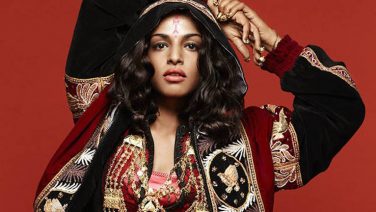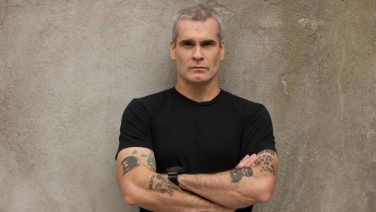ABRA interview: Finding the positive side of darkness and embracing her ‘weirdo’ side
November 3rd 2016
Xiaoran Shi

Notoriously guarded, ABRA opens up to Xiaoran Shi about being a teenage weirdo, retaining her blackness, and how she’s not interested in your sad girl fantasy.
ABRA first made her mark on the music world with acoustic covers of rap bangers on YouTube in 2007. Almost a decade later, she’s back on YouTube, this time starring in a music video for ‘Crybaby’, a cut from Princess, her latest EP on True Panther. With its jagged ’80s basslines and operatic vocal work, the song takes no pains to hide its devotion to Whitney Houston-esque electro-pop as ABRA embraces a palette beyond the brooding minimalism of her previous two releases.
The video for ‘Crybaby’ sees ABRA side-stepping and spinning wistfully through an abandoned fairground as she sings about a love turned cold. This juxtaposition between youthful euphoria and melancholic desperation perfectly exemplifies not only the complexity of her music, but also the woman behind the lyrics. Notoriously guarded, ABRA opens up to Xiaoran Shi about being a teenage weirdo, retaining her blackness, and the fear of dying alone.
———
You’ve mentioned that Princess is a lot less personal, a lot less “spite-fuelled” than your previous work. What were your motivations or objectives with this new record?
I was just having fun, as opposed to really trying to express myself and find the right words to write this secret letter to someone who wouldn’t let me get the last word in. It was more freestyle and more relaxed. It was me trying to change up my production too. I’m not upset over that same person, but I’ve still gone through a lot of heartbreak since becoming a musician. But, it’s not so much about going ahead and making a success out of myself – I think I’ve been successful. I’m happy with where I’ve gone. I’m not really in the headspace of using my career to make myself feel better.
Yeah, your career shouldn’t be a crutch. So, you’re currently more interested in harnessing positivity after working through the negativity on your last few releases?
Yeah, I’ve gone through weird things that have given me a lot of complexes, so I don’t really want that to be the reason I’m making art. I want to be more positive than that.
What do you mean by ‘complexes’?
I didn’t have an easy time growing up. I wasn’t surrounded by a lot of people who were positive or uplifting. It felt like I was always getting kicked down and nothing would work out for me. It affected me negatively as a kid and I grew up to be really angry in high school and college. I isolated myself a lot, and learned to be quiet and repress myself. Now I’m forcing myself to get over that. I’ve been using art to express myself and it’s been like therapy for me.
I’ve never talked to anyone about why I am the way I am, but now in art, it’s forcing me to listen to my emotions and cry. It’s cathartic.
It’s great you’ve come through to the other side of that and reached a point where you write and produce all your own music. Do you feel like you’ve come up against a lot of sexism or stigma in the industry as a woman who can do everything?
In the past, when I mentioned I had an interest in music, people wouldn’t take me seriously and try to shut me down. Around the time I was putting out BLQ Velvet, my male peers weren’t very encouraging and I’ve met a lot of people in the business who suggested I should work with producers, or get someone in to do this or get someone in to do that. If I want to work with producers, I would. I didn’t ask for their take on it, so I don’t really pay attention to it.
Interesting. I think that really ties in what you’ve said in previous interviews about being tired of the “sad girl shit” and choosing to define yourself through confidence instead. How is that idea explored in your music?
There’s been a very specific box that black women have been allowed to exist in. On a big scale, it’s like a death match. There’s only ever one black female who’s at the top. There are not a lot of women, especially black women, who can succeed at doing the same genre of music. There’s a Beyoncé, a Rihanna, a Corinne Bailey Rae. They have to be a prototype and there can only be one.
Growing up, I got made fun of for not knowing the whole discography of whoever was doing R&B or rap back then. It was isolating. People would always call me a weirdo because I liked different things. I wasn’t allowed to retain my blackness and who I was and what I liked without offending or confusing someone. So, I try my hardest now to be myself and really not conform to what people think I should be or what kind of music I should make as a black woman.
If I get in an Uber and someone’s like, “You make music? What kind of music do you make? R&B?” I’m like, “Why would that be the first thing you assume?” So, I just stick to what I want to do. I try to keep pushing it for all the weirdo black girls out there.
What were these weirdo interests of yours?
I read a lot of fantasy books. I was into role-playing. I liked anime. My brother listened to a lot of punk and rock, so I listened to a lot of punk and rock. I didn’t hang out at the mall; I was on the Internet a lot just being a weirdo and people would call me out for it.
I was a teen punk brat too. What bands did you listen to?
Oh, really mainstream stuff: Sum 41, Blink 182, Green Day. Whatever my brother listened to, I listened to.
Speaking of family, you’ve been with the Awful Records crew for about 2 years now. How has being part of such an intensely collaborative collective influenced your music?
My stuff before was super out there in the sense that it wasn’t really relatable or digestible to anybody. When I joined Awful, I was surrounded by a bunch of people I respected so I wanted to impress them. But they were all making rap music, so I was trying to think about what I could do to relate and fit in. That’s when I started using a lot more 808s; I took what I liked from what they were doing and tried to make it my own.
I really wouldn’t have tried new things as much if it weren’t for those Awful showcases where there were 16 of us and they would all do rap, so I was like, “Where do I fit in?” It started off as me trying to make music where I could be on a lineup with my friends, but still be nobody but myself. That’s how I developed the sound I have now.
What’s your creative process like?
My creative process has been pretty much the same since I started. It would be smoke some weed, then drive down a long, empty highway, listen to a beat or melody and try to make something of it. Then I don’t stop until I’m done. It’s a weird, cathartic process, but very natural. I don’t like to sit down and be like, “I’m about to write something now.” It’s just like, “I feel inspired, I’m going to do this right now and I don’t stop until I’m finished.”
I know you’re a big fan of horror movies, but what are you most afraid of IRL?
Probably being alone forever. As long as I remember, I’ve always wanted to have someone by my side; someone to love and someone to love me back. Someone to build a family with. Not having that is a big fear of mine. It’s not like I’m so depressed on my own, but I really crave an intimate connection with somebody. It’s weird having all these people around you who are like, “You’re cool! You’re great!” but they don’t really know you and you can’t find anyone who knows you to actually care for you. Everyone likes ABRA, but they don’t know who I am and that’s a really hard thing I’m learning to deal with now. People [think of] me as the face of ABRA, my art, but I don’t know if that necessarily equates to who I am as a person.
Have you found that people relate to you differently after you started blowing up?
I don’t think of myself as famous, but when people want to talk to me or date me, in the back of my mind, I’m like, “Can I trust you?”. Because with ABRA, I’m always going to put my best foot forward and be my best self, but I can’t do that all the time. Sometimes, I’m going to mess up. It does make me look at someone twice when they tell me they want to be around me and I already had trust issues to begin with!
That sounds like a fucking minefield to navigate.
I’m still trying to figure it out, girl. I’m right in the middle of that. How do I connect to someone without being a dickhead? I hate the fact I look at people who say they like me and think, what do you like me for? Do you really like me, or do you like the idea of me?
Jesus, yeah, trying to figure out whether someone likes you for you or for the idea of you is hard enough when it comes to something as silly as Tinder – and that’s without the added layers of complexity that fames brings into the mix.
Yeah, Tinder’s weird. It’s more about personality for me. You can be as beautiful as you want to be, but chemistry is when I see you in person, how you act, how you treat others. It’s not about what your profile says and what your Facebook’s like.
Totally. Is there a story behind the name ABRA? Are you named after the Pokémon?
No. I like the idea, the spell ‘abracadabra’. That’s what that means. It gives people power. If I say I’m going to do something then I can do it.
And what about the “darkwave duchess”?
That’s more about the aesthetic. But also, I like darkness because there’s mystery there. Taking risks on shit and not making fear-based decisions; that’s the kind of darkness I like. Like, go into the dark, find out what’s there, light a candle on that bitch and keep it moving. You don’t have to only go where you know. Venture into the darkness, see what’s out there, try and explore all the frontiers.
ABRA’s Princess EP is out now via True Panther Sounds.





